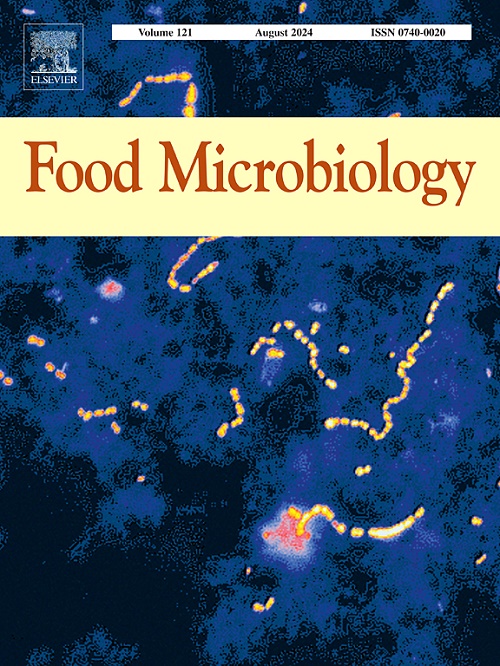The food application of a novel Staphylococcus aureus bacteriophage vB_SA_STAP152 and its endolysin LysP152 with high enzymatic activity under cold temperature
IF 4.5
1区 农林科学
Q1 BIOTECHNOLOGY & APPLIED MICROBIOLOGY
引用次数: 0
Abstract
Staphylococcus aureus, a foodborne bacterial pathogen, poses a serious challenge due to antibiotic resistance, highlighting the urgent need for effective and alternative antimicrobial agents. Undoubtedly, bacteriophages and bacteriophage-encoded antibacterial proteins have been considered effective biopreservatives. Herein, we report the isolation and characterization of a novel lytic bacteriophage, vB_SA_STAP152, along with its endolysin LysP152. Morphological and genomic analysis revealed that vB_SA_STAP152 could be considered as a new species in the Rosenblumvirus genus. Stability tests demonstrated that vB_SA_STAP152 can withstand a range of temperatures (∼65 °C) and pH values (4–11). Moreover, we successfully cloned and expressed the bacteriophage-encoded protein, endolysin LysP152, which exhibited optimal activity at temperatures between 4 and 35 °C and within a broad pH range (4–11). The antibacterial spectrum experiments revealed that phage vB_SA_STAP152 effectively targeted 76.15% of S. aureus strains across 14 different sequence types (STs), particularly including community-associated methicillin-resistant S. aureus (CA-MRSA) ST59. Furthermore, endolysin LysP152 demonstrated complete lysis all tested S. aureus strains spanning 17 STs. Subsequently, the efficacy of vB_SA_STAP152 and LysP152 against MRSA in pork was evaluated, revealing a significant reduction of bacterial counts by 4.27–4.42 log10 CFU/mL with phage vB_SA_STAP152 at room temperature and by 3.31 log10 CFU/mL with endolysin LysP152 at refrigerator temperature. Overall, the in-vitro studies and favorable physical and chemical properties suggested that phage vB_SA_STAP152 and endolysin LysP152 have the potential to be developed as antimicrobial agents against S. aureus in the food industry.
研究了一种新型金黄色葡萄球菌噬菌体vB_SA_STAP152及其具有高酶活性的内溶素LysP152在低温下的食品应用
金黄色葡萄球菌是一种食源性细菌病原体,由于抗生素耐药性而构成严重挑战,因此迫切需要有效和替代的抗菌药物。毫无疑问,噬菌体和噬菌体编码的抗菌蛋白被认为是有效的生物防腐剂。在此,我们报道了一种新的裂解噬菌体vB_SA_STAP152及其内溶素LysP152的分离和表征。形态学和基因组分析表明,vB_SA_STAP152可被认为是Rosenblumvirus属的一个新种。稳定性测试表明,vB_SA_STAP152可以承受温度范围(~ 65°C)和pH值(4-11)。此外,我们成功克隆并表达了噬菌体编码的蛋白,内溶素LysP152,该蛋白在4 - 35°C和较宽的pH范围内表现出最佳活性(4 - 11)。抗菌谱实验显示,噬菌体vB_SA_STAP152有效靶向14种不同序列类型(STs)的金黄色葡萄球菌菌株76.15%,特别是社区相关性耐甲氧西林金黄色葡萄球菌(CA-MRSA) ST59。此外,内溶素LysP152能够完全溶解所有跨越17个STs的金黄色葡萄球菌菌株。随后,对vB_SA_STAP152和LysP152对猪肉MRSA的效果进行了评估,结果表明,噬菌体vB_SA_STAP152在室温下可显著减少细菌数量4.27-4.42 log10 CFU/mL,内溶素LysP152在冰箱温度下可显著减少细菌数量3.31 log10 CFU/mL。总之,体外研究和良好的理化性质表明噬菌体vB_SA_STAP152和内溶素LysP152具有开发作为食品工业中金黄色葡萄球菌抗菌药物的潜力。
本文章由计算机程序翻译,如有差异,请以英文原文为准。
求助全文
约1分钟内获得全文
求助全文
来源期刊

Food microbiology
工程技术-生物工程与应用微生物
CiteScore
11.30
自引率
3.80%
发文量
179
审稿时长
44 days
期刊介绍:
Food Microbiology publishes original research articles, short communications, review papers, letters, news items and book reviews dealing with all aspects of the microbiology of foods. The editors aim to publish manuscripts of the highest quality which are both relevant and applicable to the broad field covered by the journal. Studies must be novel, have a clear connection to food microbiology, and be of general interest to the international community of food microbiologists. The editors make every effort to ensure rapid and fair reviews, resulting in timely publication of accepted manuscripts.
 求助内容:
求助内容: 应助结果提醒方式:
应助结果提醒方式:


